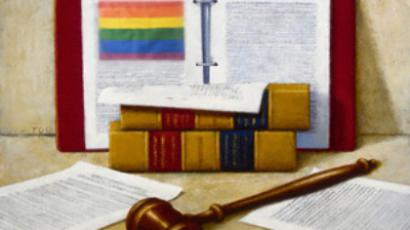Gay Pride march held despite Moscow city ban
Russian gay rights activists have held a rally in the center of Moscow despite a ban imposed by the city's authorities.
A march by several dozen participants took place on the Stary Arbat pedestrian street.
Activists were carrying rainbow flags and banners with such slogans as “Fight profit, down with homophobia!” and “Equal rights for gays without compromises”.
“We still have not managed to establish a dialogue with society”, said one of the gay activists. “We want to explain to people what the problems are. We are fighting gay discrimination everywhere – in the family, at school, at work, everywhere.”
The protesters walked for about a kilometer and left when they saw policemen. There have been no reports of attempts to stop the activists.
A few hours later another march took place in northwest Moscow. A smaller international group walked along Leningradsky Prospect chanting “Russia without homophobes!” and “Equal rights, no compromise!”
On Saturday representatives of the Russian Orthodox, Protestant, Muslim and Buddhist communities made statements in support of Moscow Mayor Yury Luzhkov’s position and against public actions by sexual minorities.
Run up to protest
Annual rally in the center of Moscow has been banned by the city's authorities for the fifth year in a row. The protesters have appealed against the authorities ban.
As part of the march on Saturday, the activists wanted to unfold a large rainbow flag – the symbol of the gay rights movement – outside the European Commission headquarters in Moscow to send the message that they will carry on campaigning for their rights despite the court ban.They also said that this protest is not about holding a carnival – it is about a serious campaign for their equal rights.
“I used to think that gay pride marches were all about showing off your sexual orientation – people posing in feathers,” said Evgeniya Otto, an activist from “Equality March”, a movement against gender discrimination. “But then I realized that gay pride means fighting for your rights. It is not about being proud of the fact that you are gay or lesbian, it is about being proud of your fight for your rights. That is why I decided to join the march for equality.”
There are not only Russian gay rights campaigners among those who were taking part in Saturday’s protests, but also noted activists from across world who came to Moscow to show their support, such as Peter Tatchell of Outrage! in London, and Andy Thayer for the Gay Liberation Network in Chicago.
The stand off between LGBT demonstrators and the Russian capital’s authorities has been ongoing for the past five years, and a predictable pattern has emerged – every time the Moscow government baned the rally the police dispersed it.
As a result of the clashes, gay rights activists have made appeals to the European Court of Human Rights.
Moscow Mayor Yury Luzhkov, who holds strong views on the matter, has in the past labeled the pride rallies “satanic” and an abomination. However, the authorities who have issued the ban say it is being done for pubic safety reasons.
The city administration claims that such rallies inflame many passions in Russian society, which is still deeply divided over the issue of homosexuality, and that the people that come out to counter-protest create large disturbances, which are not in the interest of public safety.
“God has created the man and the woman for a certain reason,” said an opponent of the pride march. “A man has to be a man, and a woman has to be a woman. I am against gay relationships and I am against this parade.”
Nikolay Petrov from the Carnegie Moscow Center is optimistic about the prospects of gay rights in Russia.
“We cannot expect the situation will improve immediately, overnight. But we have seen several attempts to organize parades over the recent years and an intense public discussion. I think sooner or later authorities will be forced to change their mind, or at least their behavior. And I would not underestimate the importance of the court decision which is going to be made in Strasbourg,” he told RT.













